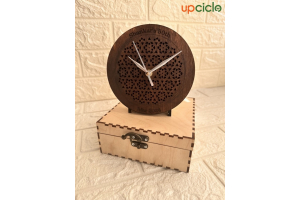Be Conscious and Sustainably Smart

With repeated use and abuse of resources available to us, we have fallen into a trap of unsustainable living, where many struggle to make a conscious and eco-friendly choice. Often, it turns out that we are unaware of the sources and processes that a product has been through before it reaches us, whether it could be responsible for global warming, causing pollution, unnecessary deforestation, unsustainable labour, or heavy wastage of unusable materials.
We regularly change toothbrushes without realizing just how many are thrown out in landfills, we indulge in frequent style changes, otherwise known as “fast fashion.” Women have excessive sanitary waste disposed of on a regular basis — the list goes on, with bottled water, single ketchup sachets, and whatnot. Our clothing choices matter heavily for the overall well-being of planet earth. Synthetic fabrics often end up with fine threads reaching the ocean, so microscopic — we end up eating them when we consume seafood. Fabrics like viscose, which claim to be 100% plant-based too, use a small percentage of the wood pulp while wasting a lot of material, and also wasting a lot of water in the process.

It is now time to reduce the burden of waste on the environment, so that we can have the essentials that we need, and not the things for our greed. What if we consciously moved towards using more organic products, to create a sustainable and green lifestyle? One of many advantages of eco-friendly products is reducing the carbon footprint in each step of mass manufacturing. With the simple motto of “reduce, reuse and recycle,” making eco-friendly choices ensures the use of biodegradable materials, more natural, effective remedies through organic skincare, organic foods, organic fabrics — finally stopping the production or consumption of single-use plastics. Even minimising your organic wastes by using them in composting, and making responsible choices like rainwater harvesting can be of great benefit in the long run.
Especially in this modern era, it is easy to make lifestyle choices that can bring a positive outcome and cause less damage to the environment. With small steps, you can avoid contributing to waste as well as avoid spending money:
- If you go shopping, be wise to carry a foldable shopping bag with you. They don’t occupy space or weigh much, and save you money each time.
- If you go out on a picnic with your food all packed, you will definitely use disposable utensils. You can make the choice to use eco-friendly plates, cups, and cutlery which can be composted back for the benefit of the earth.
- Try using rechargeable batteries instead of throwing them out so frequently.
- Get milk from your local dairy in a glass bottle every morning instead of the plastic packets.
- Women can also try using a menstrual cup instead of sanitary napkins or tampons, which pile up as heavy waste. Although the menstrual cup seems like a more expensive option, it is a one-time investment which could last you the better part of ten years, while being sustainable and hygienic, eventually saving a lot of money.

Make small changes to your lifestyle, by using green, sustainable products. Consider switching to bamboo toothbrushes instead of the plastic brushes in plastic packaging, these eco-friendly brushes come with charcoal-infused, interchangeable bristles to help you minimise waste. Indulge in the use of beautiful home decor and accessories made of cork, coconut shells, bamboo and banana fibres, which are more durable, and will be naturally compostable, finally returned to the green earth. Upcycle those old glass bottles you have lying around in your home — decorate them, use them as light fittings, build your Christmas tree out of bottles or even put money plants in them for your balcony garden. Use an old tyre as a stool by putting a wooden plank and winding ropes on it. It is a positive, empowering choice to make when you can reduce the waste being thrown out, and gain something useful from it instead. The art of upcycling puts no limits on your creativity or the yield you can enjoy from a single material. It's time to understand the importance of maximising the productivity of an object that can serve a new purpose and stay useful in the long run.




